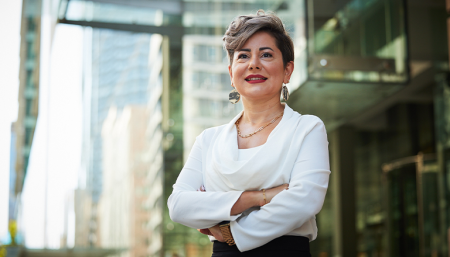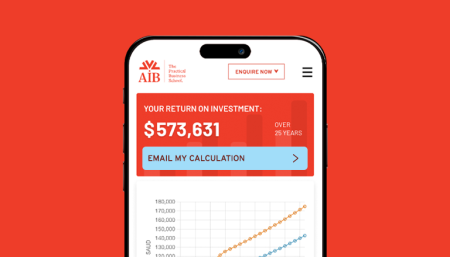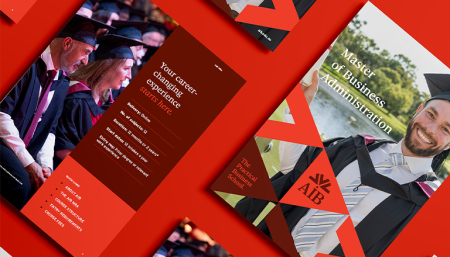How to do an MBA without a degree? MBA without Bachelor

You feel that it’s time to accelerate your career and take the next step towards your professional goals. You’re a natural-born leader, have plenty of expertise and have shown dedication to your company with years of service. Yet you still find your career plateauing. Could it be that your lack of formal qualifications is holding you back?
If you’ve never studied before, undertaking an MBA can seem like an overwhelming experience – but you’re certainly not alone. AIB’s Course Advisor Trevor Mann spoke to us to explain how you can do our professional MBA without a degree, as well as the application process and the benefits.
Talk to a Course Advisor here.
Can you do an MBA without a degree?
The short answer? Yes, you can apply for and complete an MBA without a degree or tertiary education of any kind. That’s because your experience may meet the admission criteria to qualify for an MBA, even if you don’t have an undergraduate qualification.
According to Trevor, “about half of all AIB’s MBA students don’t have a degree,” but thankfully, it isn’t a problem. “One of the strengths of our MBA is that it’s delivered with a practical focus, so the need for an undergraduate degree isn’t there.”
In fact, Trevor claims that not having any formal academic history is sometimes actually a benefit. “It’s one of the best ways to come into the program because people can utilise their experience base significantly. They actually increase their return on investment because they can relate their learning with their own knowledge. That’s how students are able to create great ideas and boost their learning.”
What are the entry requirements if you don’t have an MBA?
Trevor explains that there are two main pathways to apply for our MBA. The first is through academic achievement. The second is via managerial experience. Applicants need at least five years of management experience in order to be eligible.
“It doesn’t have to be through a people leadership role. It can be project-based,” Trevor clarifies. “That means your experience doesn’t have to be title-based. It can be based on what you actually did for the company, rather than the official role you were given.”
View our MBA entry requirements.
Check your eligibility to apply.
Why should I apply for an MBA without a degree?
In Trevor’s opinion, for many students, “the fear of getting started is the biggest.” And while applying for an MBA without a degree can be intimidating, Trevor is quick to put students’ minds at ease.
“This MBA is about demonstrating knowledge. When students start the program, the first subject they do is Leadership,” says Trevor. The Leadership subject provides a scholarly and in-depth knowledge of the dynamics of leadership and how it applies to contemporary leadership practice.
Trevor continues, “Many students already have this leadership experience through their work. It’s a good, confidence-boosting start to the MBA. After a week they realise it isn’t so bad – in fact, it’s engrossing and they want to study”
What can I expect from the MBA?
“I like to use an analogy when I first talk to a potential student,” Trevor smiles. “When you go to the pool, do you walk down the steps or jump in the deep end? This makes them think – do I leap in and do things, or do I procrastinate because I think I don’t have the time or confidence?”
Trevor goes on to describe what students can expect from the MBA. “I always explain that the program is in bite-sized pieces, that they have support and it’s totally flexible.”
“The support is huge,” Trevor elaborates. “People think that they’re on their own because it’s an online program. I tell them that it’s delivered online, but the support isn’t absent. Every subject has a dedicated Online Learning Facilitator that they can contact anytime for help and guidance. All our facilitators are qualified lecturers and experienced leaders in their industry.”
AIB also offers wellbeing support through Converge International – an Employee Assistance Program (EAP) that is available for both AIB staff and students Completely free of charge, our EAP offers help with a variety of work-related and personal problems and gives you access to qualified professionals including psychologists, social workers and management support counsellors.
Learn more about our wellbeing resources.
Top tips for studying an MBA without a degree
Speak up
“Get started early,” stresses Trevor. “Do the readings before classes start. Ask questions. And don’t be scared to ask for advice.” According to Trevor, it can be hard for new students to speak up if they’ve never had a formal academic experience before. “People might be in a role and be good at it, so they feel like they need to be a pillar of strength all the time. They hide their insecurity about not feeling confident in the program.”
The best way to cut through this vulnerability? More support. “That additional layer of support is critical for progress. I always tell students they can even call me for guidance. Because if I can get to a personal level to encourage them to acknowledge their vulnerability, we all win.”
Review our website
The AIB website is full of resources and guides to support you throughout your study. The AIB Style Guide is one of the key documents you’ll refer to throughout your studies and sets out the guidelines to follow when preparing your assessments. It also explains how to produce different types of academic writing such as descriptive, evaluative, analytical and critical.
Assessment Policy and Procedure outlines everything related to your subject assessments including the brief, weighting, word count and due dates.
The Assessments page on our website takes you through submission guidelines, academic integrity resources, writing and referencing resources, and support for understanding your grades and feedback.
Delivered online with continual updates, innovations and new releases, the AIB MBA offers genuine flexibility, industry insights, practical skills and the support you need to achieve your goals in our fast-changing world. It’s created for people just like you.





